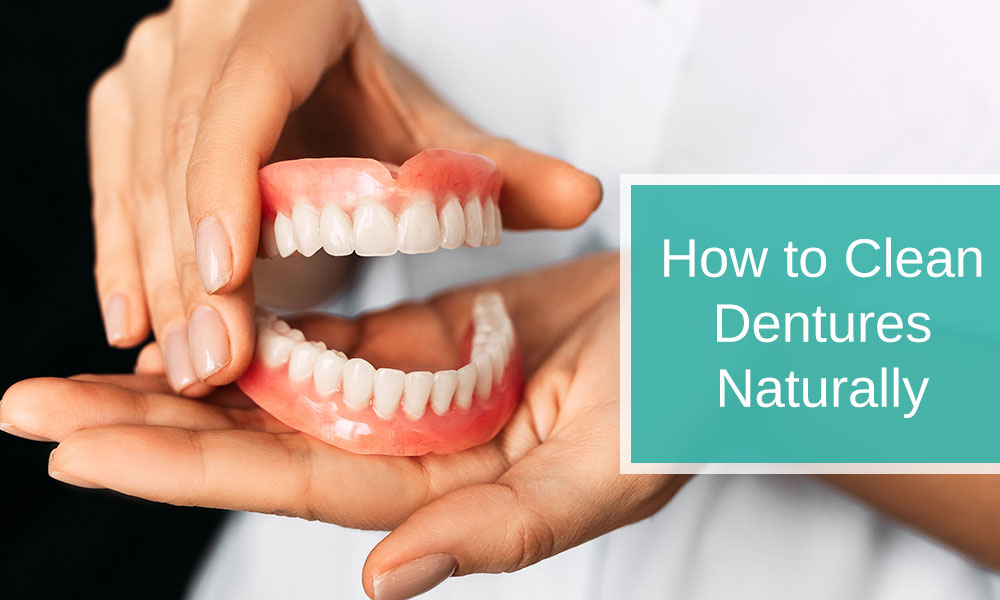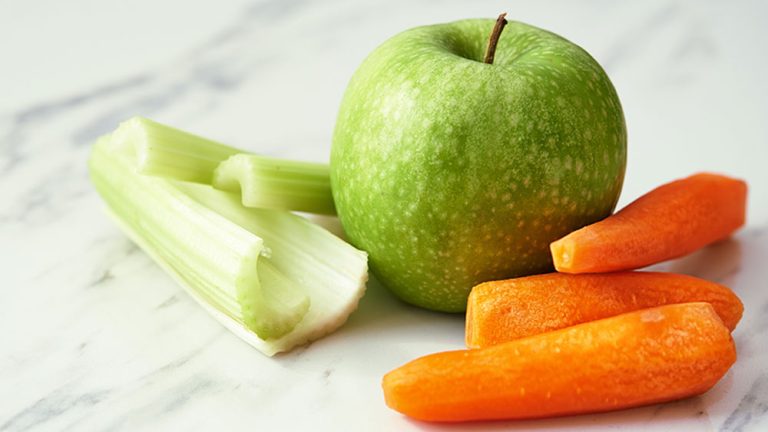
How to Clean Dentures Naturally?
Ensuring the longevity of dentures involves steering clear of common cleaning pitfalls. Let’s uncover these mistakes and understand how to avoid them:
- Overusing Abrasive Cleaners:
- Impact: Abrasive cleaners can wear down denture surfaces, leading to scratches and reduced lifespan.
- Solution: Opt for softer, natural cleaning agents like baking soda to prevent abrasion.
- Inconsistent Daily Cleaning:
- Impact: Skipping daily cleaning routines can lead to plaque buildup, compromising oral health.
- Solution: Establish a consistent morning and nightly cleaning routine to maintain denture hygiene.
- Improper Storage Practices:
- Impact: Incorrect storage can deform dentures and compromise their structural integrity.
- Solution: Store dentures in a clean, moist environment when not in use, avoiding excessive dryness.
By understanding and avoiding these common mistakes, individuals can significantly contribute to the longevity and effectiveness of their dentures.
Materials Needed for Natural Denture Cleaning
Embarking on the journey of natural denture cleaning requires assembling the right materials. Let’s explore the key components necessary for an effective and chemical-free cleaning routine:
- Baking Soda:
- Purpose: Acts as a gentle abrasive cleaner to remove stains and plaque.
- Usage: Sprinkle a small amount on a wet toothbrush for daily brushing.
- White Vinegar:
- Purpose: Natural disinfectant and effective against bacteria and stains.
- Usage: Soak dentures in a mixture of vinegar and water for a few hours.
- Tea Tree Oil:
- Purpose: Exhibits antifungal and antibacterial properties.
- Usage: Add a few drops to water for soaking dentures overnight.
- Soft-Bristled Toothbrush:
- Purpose: Gently cleans dentures without causing damage.
- Usage: Brush dentures with a soft-bristled toothbrush as part of the daily cleaning routine.
- Denture Cleaning Tablets (Optional):
- Purpose: Effervescent tablets aid in removing stains and disinfecting dentures.
- Usage: Follow the product instructions for soaking dentures periodically.
Tips:
- Mixing Solutions: Experiment with combining these ingredients for enhanced cleaning power.
- Quality of Materials: Invest in high-quality baking soda, vinegar, and tea tree oil for optimal results.
Now that we have the necessary materials at our disposal, let’s delve into a step-by-step guide on how to clean dentures naturally.
Step-by-Step Guide on How to Clean Dentures Naturally
Maintaining clean dentures naturally involves a two-pronged approach: a daily morning routine and a more thorough nightly cleaning ritual.
Morning Routine: Daily Cleaning
- Remove Dentures Gently:
- Begin by removing dentures carefully to avoid any damage.
- Rinse Dentures Under Running Water:
- Use lukewarm water to rinse off any loose debris or adhesive.
- Brush with Baking Soda:
- Sprinkle a small amount of baking soda on a wet toothbrush.
- Gently brush all surfaces of the dentures, including crevices and corners.
- Rinse Again Thoroughly:
- Ensure all traces of baking soda are washed away under running water.
- Soak Dentures in a Vinegar Solution (Optional):
- Prepare a mixture of white vinegar and water.
- Soak dentures for a short duration to harness the natural disinfecting properties of vinegar.
Nightly Routine: Thorough Cleaning
- Remove Dentures for Overnight Soak:
- Take out dentures and allow them to rest overnight for optimal oral health.
- Brush with Tea Tree Oil:
- Add a few drops of tea tree oil to water.
- Use a soft-bristled toothbrush to clean dentures thoroughly.
- Vinegar Soak for Disinfection:
- Prepare a fresh mixture of vinegar and water.
- Soak dentures for a more extended period, preferably overnight, to eliminate bacteria.
- Air-Dry Dentures:
- Allow dentures to air-dry to prevent the growth of bacteria in a moist environment.
By incorporating these steps into your daily and nightly routines, you’re not only maintaining cleanliness but also promoting the longevity of your dentures naturally.
Natural Cleaning Solutions for Dentures
Now that we’ve established a solid routine for cleaning dentures, let’s explore the natural cleaning solutions that form the backbone of our chemical-free approach. These solutions leverage the power of common household items to ensure effective cleaning without compromising the integrity of dentures.
1. Baking Soda
- Antibacterial Properties: Baking soda acts as a natural antibacterial agent, helping to eliminate bacteria that may accumulate on dentures.
- Stain Removal: Its gentle abrasive nature aids in removing stubborn stains without causing damage to the denture surface.
- Neutralizes Odors: Baking soda neutralizes unpleasant odors, leaving dentures fresh and clean.
Usage Tip: Combine baking soda with water to form a paste for a deeper cleaning effect. Gently brush dentures with this paste, paying attention to areas with stains or plaque.
2. White Vinegar
- Disinfectant Power: White vinegar is renowned for its disinfectant properties, effectively eliminating bacteria and germs.
- Stain Dissolution: It helps dissolve stains on dentures, especially those caused by substances like coffee or tea.
- Natural Deodorizer: Vinegar acts as a natural deodorizer, ensuring that dentures remain fresh throughout the day.
Usage Tip: Soak dentures in a mixture of white vinegar and water for a few hours, especially during the nightly cleaning routine, to benefit from its disinfecting properties.
3. Tea Tree Oil
- Antifungal and Antibacterial: Tea tree oil exhibits both antifungal and antibacterial properties, providing an additional layer of protection.
- Reducing Plaque Formation: Regular use of tea tree oil can help reduce the formation of plaque on dentures.
- Refreshing Scent: Its natural aroma adds a pleasant fragrance to dentures.
Usage Tip: Add a few drops of tea tree oil to water for soaking dentures overnight. This not only cleans but also imparts the benefits of tea tree oil to the dentures.
Incorporating these natural cleaning solutions into your routine not only ensures effective cleaning but also contributes to a healthier oral environment. As we explore further, let’s dive into homemade denture cleaning recipes, allowing you to customize your cleaning approach based on individual preferences.
Homemade Denture Cleaning Recipes
Creating your own denture cleaning solutions at home provides the flexibility to tailor the cleaning process to your specific needs. Let’s explore some simple and effective homemade recipes using readily available ingredients:
1. Baking Soda Paste
Ingredients:
- 1 tablespoon of baking soda
- Enough water to form a paste
Instructions:
- Mix the baking soda with water to create a paste.
- Apply the paste to a soft-bristled toothbrush.
- Gently brush your dentures, focusing on stained or plaque-prone areas.
- Rinse thoroughly with water.
Note: This recipe is excellent for daily cleaning and stain removal.
2. Vinegar Soak
Ingredients:
- 1/4 cup of white vinegar
- 1 cup of water
Instructions:
- Mix white vinegar with water in a bowl.
- Soak your dentures in the solution for a few hours.
- Remove dentures and rinse thoroughly under running water.
Note: This recipe provides a deep cleaning and disinfecting effect, suitable for periodic use.
3. Tea Tree Oil Rinse
Ingredients:
- 3-4 drops of tea tree oil
- 1 cup of water
Instructions:
- Add tea tree oil to a cup of water.
- Swish the solution around your dentures for 30 seconds to 1 minute.
- Spit out the solution and rinse your dentures thoroughly with water.
Note: Tea tree oil adds an extra layer of antifungal and antibacterial protection.
Experiment with these recipes to find the combination that works best for you. The natural ingredients ensure effective cleaning without exposing your dentures to harsh chemicals.
As we navigate through our denture care journey, the next section will guide you on handling dentures with care, ensuring their longevity and your comfort.
Tips for Handling Dentures with Care
Proper handling of dentures is crucial for maintaining their longevity and ensuring your comfort. Here are essential tips to keep in mind:
- Handle with Clean Hands:
- Always clean your hands thoroughly before handling dentures to avoid transferring dirt or bacteria.
- Use a Soft Towel or Basin:
- Place a soft towel or fill the sink with water to prevent damage if dentures accidentally fall.
- Brush Dentures Over a Soft Surface:
- Brush dentures over a basin of water or a soft surface to minimize the impact in case they slip from your hands.
- Avoid Hot Water:
- Hot water can cause dentures to warp. Use lukewarm or cool water for cleaning and soaking.
- Use a Denture Brush:
- Invest in a soft-bristled denture brush to clean your dentures thoroughly without causing scratches.
- Inspect for Damage:
- Regularly inspect dentures for cracks, chips, or any signs of damage. If detected, consult your dentist for repairs.
- Handle with Care When Removing:
- Remove dentures carefully, supporting both sides evenly to avoid bending or damaging the clasps.
- Store Properly When Not in Use:
- Store dentures in a denture solution or plain water when not in use to prevent them from drying out.
- Keep Dentures Moist:
- Dentures can lose their shape if they dry out. Ensure they remain moist, especially during overnight storage.
- Visit Your Dentist Regularly:
- Schedule regular dental check-ups to have your dentures professionally inspected and adjusted.
By adhering to these handling tips, you not only protect your investment but also contribute to the overall comfort and effectiveness of your dentures. The next section will explore lifestyle habits that complement your denture care routine.
Lifestyle Habits for Maintaining Clean Dentures
Beyond the daily cleaning routine, certain lifestyle habits play a crucial role in maintaining clean dentures and promoting overall oral health. Let’s delve into these habits:
- Hydration is Key:
- Drink an adequate amount of water throughout the day to help maintain saliva production. Saliva aids in keeping the oral environment clean and neutralizing acids.
- Nutritional Support:
- Consume a balanced diet rich in vitamins and minerals to support overall oral health. Foods like fruits, vegetables, and dairy products contribute to strong teeth and gums.
- Limit Staining Substances:
- Minimize the consumption of beverages known to cause stains, such as coffee, tea, and red wine. If consumed, rinse your mouth or clean dentures promptly.
- Avoid Smoking:
- Smoking not only poses risks to your overall health but can also stain dentures and contribute to oral health issues. Quitting smoking benefits both your dentures and your well-being.
- Practice Good Oral Hygiene:
- Even with dentures, maintaining good oral hygiene is essential. Brush your gums, tongue, and the roof of your mouth with a soft-bristled brush to eliminate bacteria and keep your mouth fresh.
- Regular Dentist Visits:
- Schedule regular check-ups with your dentist. They can assess the condition of your dentures, provide professional cleaning, and address any issues promptly.
- Avoid Hard or Sticky Foods:
- Minimize the consumption of hard or sticky foods that can place excessive stress on dentures. Opt for softer options to prevent damage.
- Use a Denture Adhesive Wisely:
- If using a denture adhesive, follow the instructions carefully. Excessive use can lead to a buildup of residue, affecting both the dentures and oral health.
By incorporating these lifestyle habits into your daily routine, you contribute to the overall cleanliness and longevity of your dentures. In the next section, we will explore how often dentures should undergo professional cleaning for optimal care.
How Often Should Dentures Be Professionally Cleaned?
Professional cleaning is a crucial aspect of denture maintenance, complementing your daily cleaning routine. The frequency of professional cleanings depends on various factors:
- Regular Check-ups:
- Schedule regular dental check-ups, ideally every six months, to have your dentures professionally examined and cleaned by a dentist.
- Individual Needs:
- Some individuals may require more frequent professional cleanings based on factors like oral hygiene habits, diet, and overall health.
- Material of Dentures:
- The type of material your dentures are made of can influence how often they need professional attention. Your dentist can provide guidance based on the specific material.
- Oral Health Conditions:
- Individuals with certain oral health conditions may benefit from more frequent professional cleanings. Your dentist will tailor the recommendation to your specific needs.
Professional cleanings involve the use of specialized tools and cleaning agents to remove stubborn stains, plaque, and tartar that may be challenging to address at home. Additionally, these appointments offer an opportunity for your dentist to assess the overall health of your oral tissues and make any necessary adjustments to your dentures.
Now, let’s move on to troubleshooting common denture cleaning issues to address potential challenges you might encounter.
Troubleshooting Common Denture Cleaning Issues
Encountering issues with denture cleaning is not uncommon, but addressing them promptly ensures your dentures remain in optimal condition. Let’s explore common problems and their solutions:
1. Persistent Stains:
- Solution: Soak dentures in a mixture of white vinegar and water or use a baking soda paste. For stubborn stains, consult your dentist for professional cleaning.
2. Unpleasant Odors:
- Solution: Regularly clean dentures with baking soda or tea tree oil to neutralize odors. Ensure dentures are thoroughly dry before storage.
3. Discomfort or Irritation:
- Solution: Check for any visible damage or changes in denture shape. If discomfort persists, consult your dentist for adjustments.
4. Buildup of Residue:
- Solution: Avoid overusing denture adhesive. Clean dentures thoroughly and follow proper storage practices to prevent residue buildup.
5. Loose Dentures:
- Solution: If dentures become loose, consult your dentist for adjustments. Changes in fit may occur over time and can impact overall comfort.
6. Difficulty Chewing:
- Solution: Ensure dentures are well-fitted. If issues persist, discuss them with your dentist to address potential adjustments or replacements.
By troubleshooting these common issues, you can maintain the effectiveness and comfort of your dentures. In the next section, we’ll address frequently asked questions to provide additional insights into denture care.
Frequently Asked Questions
Q1: How often should I clean my dentures at home?
A: Clean your dentures at least twice a day – once in the morning and once before bedtime. This routine helps remove debris, plaque, and stains, contributing to overall oral health.
Q2: Can I use regular toothpaste to clean my dentures?
A: It’s best to avoid regular toothpaste, as it can be too abrasive and damage denture materials. Opt for baking soda or specialized denture cleaners for effective yet gentle cleaning.
Q3: How long should I soak my dentures in cleaning solutions?
A: Follow the recommended guidelines for each cleaning solution. Generally, overnight soaking is beneficial for a more thorough disinfection, but consult your dentist for personalized advice.
Q4: Can I adjust my dentures at home if they feel loose?
A: No, adjusting dentures at home can lead to further damage. If your dentures feel loose, consult your dentist for professional adjustments to ensure a proper fit.
Q5: Is it necessary to remove dentures at night?
A: Yes, removing dentures at night allows your gums to rest and promotes better oral health. Soak dentures overnight to keep them moist.
Q6: How do I handle denture-related bad breath?
A: Ensure thorough cleaning of your dentures, gums, and tongue. Use natural solutions like baking soda and vinegar to neutralize odors. If bad breath persists, consult your dentist.
Incorporating these answers into your denture care routine can address common queries and enhance your overall experience. As we conclude, let’s summarize the key takeaways and emphasize the importance of a holistic approach to denture care.
Key Takeaways
Congratulations on completing the ultimate guide on how to clean dentures naturally. We’ve covered a wide array of topics, from understanding the significance of natural cleaning to troubleshooting common issues. Let’s recap the key takeaways:
- Natural Cleaning Benefits:
- Opting for natural cleaning methods contributes to denture longevity and overall oral health.
- Harsh chemicals can lead to damage and discomfort, making natural alternatives a preferable choice.
- Common Mistakes to Avoid:
- Overusing abrasive cleaners, inconsistent cleaning, and improper storage are common pitfalls to be mindful of.
- Avoiding these mistakes enhances the effectiveness of your cleaning routine.
- Materials for Natural Cleaning:
- Baking soda, white vinegar, and tea tree oil are powerful natural cleaning agents.
- Soft-bristled toothbrushes and denture cleaning tablets further enhance your cleaning arsenal.
- Step-by-Step Guide:
- Establish a daily routine involving morning brushing and nightly thorough cleaning.
- Incorporate natural solutions and allow dentures to air-dry for optimal results.
- Homemade Cleaning Recipes:
- Baking soda paste, vinegar soak, and tea tree oil rinse offer customizable cleaning options.
- Experiment with these recipes to find what works best for your needs.
- Handling Tips:
- Handle dentures with clean hands, use a soft surface for brushing, and avoid hot water.
- Regularly inspect dentures for damage and store them properly when not in use.
- Lifestyle Habits:
- Stay hydrated, maintain good nutrition, and limit substances that can stain dentures.
- Regular dental visits and proper denture care contribute to overall oral health.
- Professional Cleaning:
- Schedule regular dental check-ups for professional cleaning and adjustments.
- The frequency may vary based on individual needs and denture materials.
- Troubleshooting Issues:
- Address persistent stains, odors, discomfort, or loose dentures promptly.
- Consult your dentist for professional advice when needed.
- FAQs:
- Follow recommended cleaning frequencies, avoid regular toothpaste, and consult your dentist for adjustments.
- Removing dentures at night and addressing bad breath contribute to a holistic denture care approach.
- Also, if you are a dental student looking to view how long it takes, click here.
By integrating these practices into your daily life, you’re not only ensuring clean and well-maintained dentures but also promoting your overall oral health. Remember, a proactive and natural approach to denture care leads to a confident and comfortable smile. If you have any lingering questions, consult with your dentist for personalized guidance.
Here’s to a radiant smile and optimal denture health!



